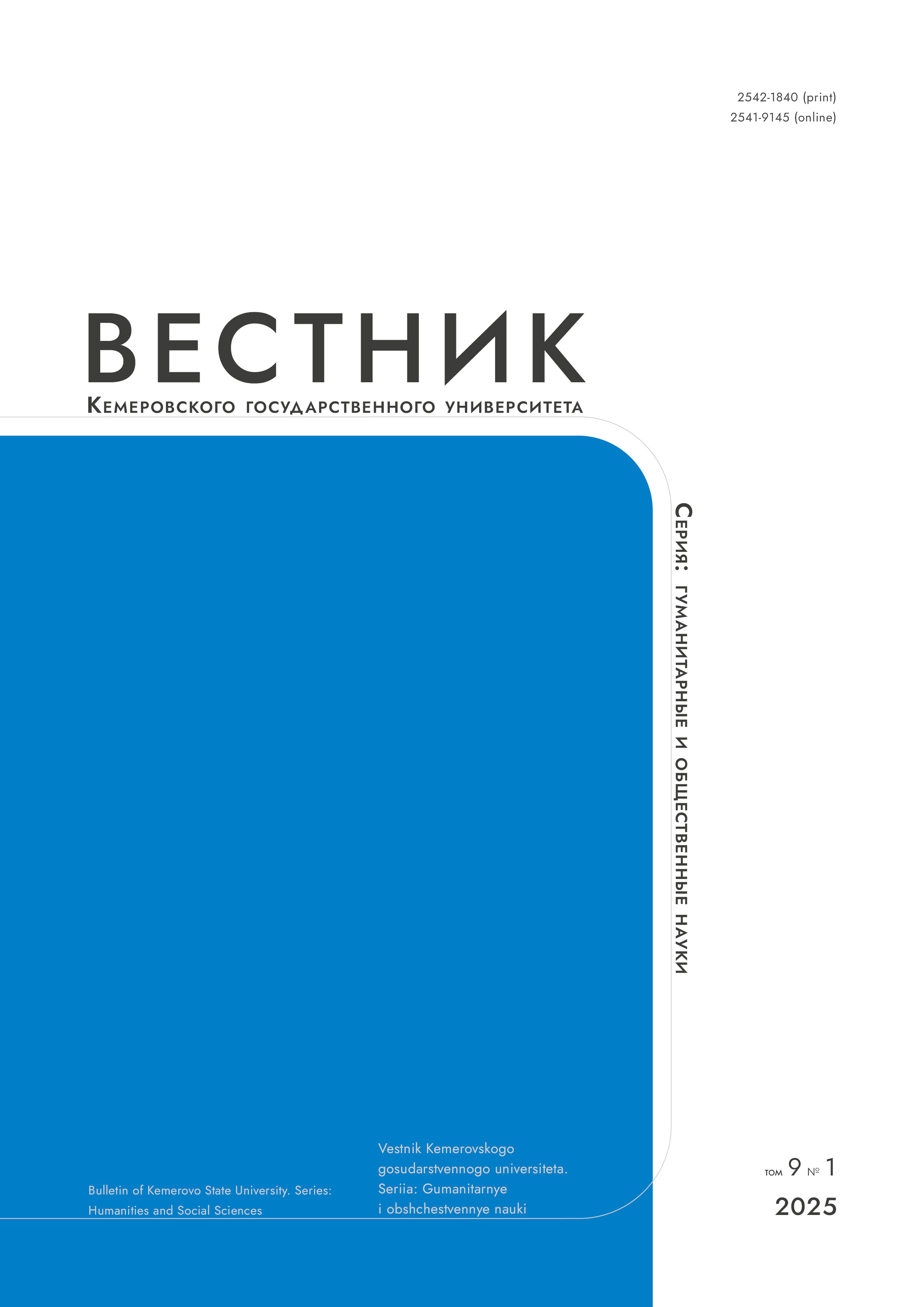Kemerovo, Russian Federation
Communicative skills are necessary for future teachers in their professional activity. They depend on a number of factors during university education. The article describes the main characteristics of communicative competence in junior students, including their role in academic activities and impact on the future professionals. Various game and training technologies allow students to obtain communication experience, learn how to speak in class, and achieve their goals using various verbal and non-verbal means. The study involved 50 first-year students of the Pedagogical Education Department, Kemerovo State University (Kemerovo, Russia). The diagnostic tools included the methodology for assessing communicative and organizational skills developed by V. V. Sinyavsky and B. A. Fedorishin, the questionnaire for assessing the level of communicative competence by I. A. Martyanova, and the method for assessing communicative skills in a specialist by V. B. Nikishina and T. D. Vasilenko. The review covered approaches to the essence and structure of a teacher’s communicative competence, its specifics, interpretations, content, and other characteristics, as well as the effect of communication trainings on communicative skills. The experiment in communication training of junior pedagogical students revealed that different communicative experience resulted in different levels of communicative competence.
communicative competence, speech activity, teaching skills, communication, components of communicative competence
1. Rotova N. A. Communicative competence of the teacher in primary education during training. Modern pedagogy, 2014, (7): 13–18. (In Russ.)] https://elibrary.ru/sjgvwd
2. Chuchalina T. V. Emotional intelligence and communicative competence of students. Current issues of personal self-development: Psychological and pedagogical aspect: Proc. All-Russian Sci.-Prac. Conf. with Intern. participation, Yoshkar-Ola, 19 May 2022. Yoshkar-Ola: MSU, 2022, 77–79. (In Russ.)] https://elibrary.ru/gccatu
3. Markova N. G., Ishimova A. I. Communicative competence of a future teacher as an indicator of effective interaction in professional activity. Development of modern education in the context of pedagogical competence: Proc. II All-Russian Sci. Conf. with Intern. participation, Cheboksary, 25 Feb 2022. Cheboksary: Sreda, 2022, 169–171. (In Russ.)] https://elibrary.ru/ppqibz
4. Shishov S. E., Agapov I. G. Competence approach to education: Fad or necessity? Standards and monitoring in education, 2002, (2): 58–62. (In Russ.)] https://elibrary.ru/rzvgzf
5. Petrovskaya L. A. Competence in communication: Socio-psychological training. Moscow: Moscow University, 1989, 216. (In Russ.)]
6. Leontiev A. N. Problems of mental development. Moscow: Prosveshchenie, 2011, 575. (In Russ.)]
7. Yemelyanov Yu. N. Theory of formation and practice of improving communicative competence. Moscow: Prosveshchenie, 2015, 183. (In Russ.)]
8. Rudensky E. V. Social and psychological viktimologiya of the personality as psychotechnical system social therapy of the viktimny personality. Siberian Pedagogical Journal, 2013, (3): 162–166. (In Russ.)] https://elibrary.ru/omzelg
9. Golovko E. A. Technology of formation of communicative competence of young university specialists at the stage of adaptation to pedagogical activity. Cand. Ped. Sci. Diss. Abstr. Stavropol, 2004, 26. (In Russ.)] https://elibrary.ru/nhpqgh
10. Borisenko D. A. Communicative competence of a teacher as a condition for the development of children’s communicative competence. Youth of the XXI century: Education, science, and innovation: Proc. VIII All-Russian Student Sci.-Prac. Conf. with Intern. participation, Novosibirsk, 4–6 Dec 2019. Novosibirsk: NSPU, 2019, 7–9. (In Russ.)] https://elibrary.ru/dfgauk
11. Gusevskaya O. V. Formation of the communicative culture of personality as the basis of general cultural competence. Values and meanings, 2009, (1): 131–141. (In Russ.)] https://elibrary.ru/kvjgiz
12. Brazhnik M. V. Communicative competence in the context of digitalization of education: Concept, components, goal setting. Education, innovation, and research as a resource for community development: Proc. III All-Russian Sci.-Prac. Conf., Cheboksary, 17 Dec 2024. Cheboksary: Sreda, 2024, 269–271. (In Russ.)] https://doi.org/10.31483/r-115053
13. Zimnaya I. A. Key competencies as the effective and targeted basis of the competence approach in education. Moscow: Issled. centr. probl. kachestva podgot. specialistov, 2004, 38. (In Russ.)]
14. Volkov B. S., Volkova N. V., Orlova E. A. Psychology pedagogical societies. 1st ed. Moscow: Iurajt, 2014, 335. (In Russ.)] https://elibrary.ru/tyoyzn
15. Zeer E. F. Psychology of professional education. 2nd ed. Moscow: Akademiia, 2013, 416. (In Russ.)]
16. Minazova V. M. Formation of students’ communicative competence in the training process: Proceedings of the conference. Technopark of universal pedagogical competencies: Proc. II All-Russian Sci.-Prac. Conf., Cheboksary, 23 Jun 2023. Cheboksary: Sreda, 2023, 214–218. (In Russ.)] https://doi.org/10.31483/r-107416
17. Ivanov D. A. Competence-based approach in education. Problems, concepts, tools. Moscow: APKiPRO, 2013, 101. (In Russ.)]
18. Kaverina O. G., Shchukina N. G. Correlation of concepts "communicative literacy", "communication", "communicative culture" in the pedagogical aspect. Didactics of mathematics: Problems and Investigations, 2019, (50): 14–19. (In Russ.)] https://elibrary.ru/tuygop
19. Kalandarov K. H. Management of public consciousness. The role of communicative processes. Moscow: Gumanit. centr "Monolit", 2018, 80. (In Russ.)]
20. Ivanov I. S. The problems of personal communicative competence in the digital environment. Phenomenology of personality: Resourcefulness and multi-aspect: Proc. All-Russian Sci.-Prac. Conf., Armavir, 22 Nov 2022. Cheboksary: Sreda, 2022, 33–39. (In Russ.)] https://elibrary.ru/eczvyj
21. Smelkova Z. S. Pedagogical communication: Theory and practice the educational dialogue of the lesson of words. Moscow: Flinta; Nauka, 2009, 292. (In Russ.)]
22. Sokolova V. V. Culture of speech and culture of teacher communication. Moscow: Prosveshchenie, 2010, 65. (In Russ.)]
23. Kirillova S. A. Effect of communicative competence on professional activity in education. Socio-pedagogical issues of education and upbringing: Proc. All-Russian Sci.-Prac. Conf. with Intern. participation, Cheboksary, 18 Feb 2021. Cheboksary: Sreda, 2021, 87–89. (In Russ.)] https://elibrary.ru/fhddnv
24. Terentyeva A. A. The role of training technologies in the development of professional and general competences of students. Science and Society: Proc. All-Russian Sci.-Prac. Conf. with Intern. participation, Novosibirsk, 1 Mar 2019. Novosibirsk: SIPPPSR, 2019, 83–86. (In Russ.)] https://elibrary.ru/ccoyqn
25. Hutorskoy A. V. Key competencies as a component of a personality-oriented education paradigm. Public Education, 2003, (2): 58–64. (In Russ.)] https://elibrary.ru/sguktl


















